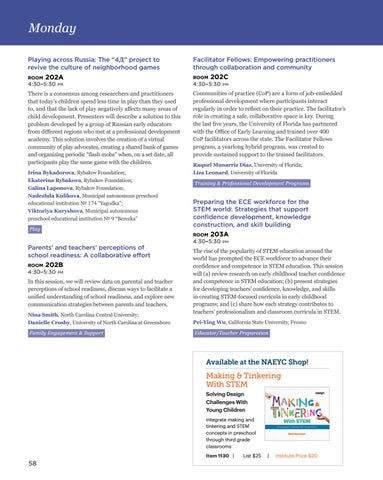Monday Playing across Russia: The “4Д” project to revive the culture of neighborhood games room
202A
4:30–5:30
pm
There is a consensus among researchers and practitioners that today’s children spend less time in play than they used to, and that the lack of play negatively affects many areas of child development. Presenters will describe a solution to this problem developed by a group of Russian early educators from different regions who met at a professional development academy. This solution involves the creation of a virtual community of play advocates, creating a shared bank of games and organizing periodic “flash mobs” when, on a set date, all participants play the same game with the children. Irina Bykadorova , Rybakov Foundation; Ekaterina Rybakova , Rybakov Foundation; Galina Laponova , Rybakov Foundation; Nadezhda Kulikova , Municipal autonomous preschool educational institution № 174 “Yagodka”; Viktoriya Kuryshova , Municipal autonomous preschool educational institution № 9 “Berezka” Play
room
202B
4:30–5:30
pm
In this session, we will review data on parental and teacher perceptions of school readiness, discuss ways to facilitate a unified understanding of school readiness, and explore new communication strategies between parents and teachers. Nina Smith , North Carolina Central University; Danielle Crosby , University of North Carolina at Greensboro Family Engagement & Support
202C
4:30–5:30
pm
Communities of practice (CoP) are a form of job-embedded professional development where participants interact regularly in order to reflect on their practice. The facilitator’s role in creating a safe, collaborative space is key. During the last five years, the University of Florida has partnered with the Office of Early Learning and trained over 400 CoP facilitators across the state. The Facilitator Fellows program, a yearlong hybrid program, was created to provide sustained support to the trained facilitators. Raquel Munarriz Diaz , University of Florida; Liza Leonard , University of Florida Training & Professional Development Programs
Preparing the ECE workforce for the STEM world: Strategies that support confidence development, knowledge construction, and skill building room
Parents’ and teachers’ perceptions of school readiness: A collaborative effort room
Facilitator Fellows: Empowering practitioners through collaboration and community
203A
4:30–5:30
pm
The rise of the popularity of STEM education around the world has prompted the ECE workforce to advance their confidence and competence in STEM education. This session will (a) review research on early childhood teacher confidence and competence in STEM education; (b) present strategies for developing teachers’ confidence, knowledge, and skills in creating STEM-focused curricula in early childhood programs; and (c) share how each strategy contributes to teachers’ professionalism and classroom curricula in STEM. Pei-Ying Wu , California State University , Fresno Educator/Teacher Preparation
Available at the NAEYC Shop!
Making & Tinkering With STEM Solving Design Challenges With Young Children Integrate making and tinkering and STEM concepts in preschool through third grade classrooms
58
Item 1130 | List $25 | Institute Price $20 2019 NAEYC Professional Learning Institute
